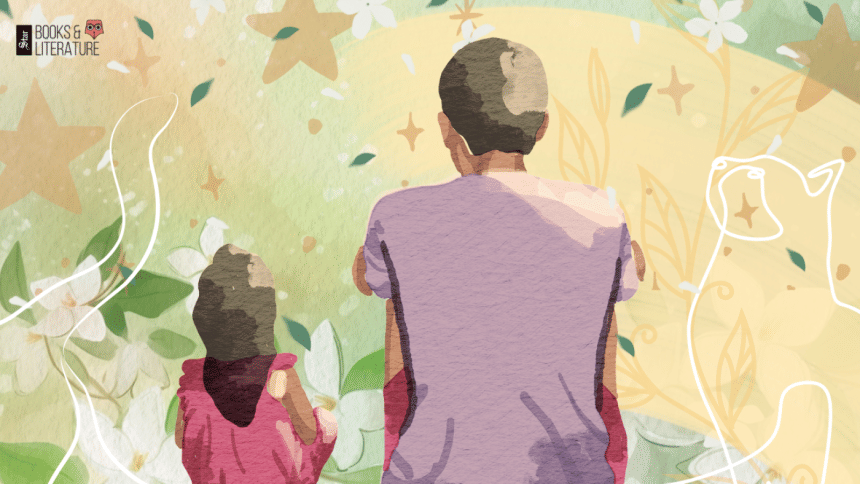Ink, jasmine, and the ghost of Ma: Unlearning my father

There's a picture of my mom and dad from before I was born. They're in what looks like a spacious launch cabin—my dad is sitting on a sofa, and my mom's head is resting in his lap. They're looking at each other, absorbed in a conversation, or rather, banter that seems to be too amusing for them to look towards the camera. And they look…happy. It's the kind of happiness you don't see much of anymore. Not the made-up kind, not performative. It's the kind born from two people who've signed on to some…I don't know, a divine agreement to be there for each other.
Every morning, my dad wakes up and—much to the annoyance of a 30-something-year-old me—walks through my room to get to the verandah, ignoring all laws of privacy and personal space. He waters his dainty little garden, stands there for a while, then plucks all the jasmines in bloom and leaves them beside my pillow before I wake. Every day during the season, I'm woken up by the sweet smell of jasmines filling the air around me.
I remember how at the start of every spring/monsoon, he would bring my mother four-five "beli phooler mala" on his way back from work. Jasmines were Ma's favourite. It was an unspoken contract: he'd bring her the garlands, and she'd pretend to be a little surprised—every day. I think that's why he now has four jasmine plants—four of the same plant, even though they all give him the same flower. Maybe tending to each one lets him hold on to that quiet ritual of affection, that silent understanding that he no longer gets to share with Ma.
I don't exactly share what one might call an "emotional bond" with my father. He's everything I'm not: funny, lively, expressive—altruistic to a fault and gullible enough to be tricked by the same person thrice. These traits often create friction between us; I'm the more pragmatic, "love in silence", uncompromising one. But as I grow older, I try to see him beyond the roles he's played: a loving husband carrying the weight of a long, slow loss; a bewildered father to an opinionated, headstrong daughter; the eldest son of now-absent parents; a responsible brother to unyielding siblings; a worried friend who's seen too many of his peers die over the years. And yet, I still struggle. Who is my father, really, if not the sum of those roles?
He often tells me how, as a teenager, he and a group of friends used to sneak across the border into Pakistan just to watch newly released films. It sounded absurd to me growing up. Who crosses into another country just to go watch a movie? But it was before the Liberation War, and we lived in a more fearless, less fractured world. And once, he got a job offer in L.A. in his younger years that he says he might have gone for, if not for his desire to marry Ma. I often wonder what life he might've led if he didn't have ageing parents to care for, younger siblings to shepherd, and a girl waiting for him to make something of himself. Still, I almost can't seem to picture him outside of those roles.
Now, this isn't my feminism leaving my body, so bear with me here: we've gotten to a place—at least some of us have—where we're starting to talk about women as whole people: beyond mothers, wives, daughters. But when it comes to our fathers, especially the ones who try to be good men, a rampant affliction known as patriarchy has left us with no language to imagine them outside of what they were to others. Strip away the roles, and what's left? Who are they, if not the "parts" they agreed to play?
Once, when I was deep in my rebellious phase, my father locked me in my room for a week to keep me away from a "bokhate chhele" I'd been secretly seeing from my coaching class. And this wasn't like the soft, western concept of being grounded either; I was hidden away in the room Rapunzel-style. I was 15 years-old. The boy was 22 or 23—older, aimless, and barely passed his classes (he was taking his O' levels at that age for the third time). But I was a lovestruck teenager, all drama and delusion, ready to break windows and kick down doors for someone who, in hindsight, didn't even like me. Of course, I couldn't literally do that. And I hated my father for it.
I hated him for months. And I'm sure, in those months, he hated me too. He hated having a daughter who refused to listen, who pushed back against everything. He wouldn't speak to me; he didn't ask me how I was doing, wouldn't randomly crack his bizarre dad jokes, as he did (does) so often. He remained stoic, emotionless, even to his only daughter, who was devastated. But what else was he supposed to do? How do you protect a teenage girl who's hell-bent on defying you, in a world that punishes girls for exactly that?
And I don't think he ever wanted to be that kind of father. Looking back, I know it's not in his nature to be forceful. But the world we live in doesn't always allow for soft parenting, especially not when you're raising a stubborn daughter alone, without a partner, in a close-minded society.
And this is where I still struggle. I don't think I'll ever fully be able to see beyond it—to see him beyond the roles he had to play. Like the rest of us, I've been shaped by a deeply male-driven world, one that both privileges and punishes men (and women, too, of course). My father isn't exempt; he's as much a product of patriarchy as he is a victim of it—of hegemonic masculinity, if we're naming it precisely. So, it becomes difficult at best, and impossible at worst, to see him as someone outside his obligations to the people around him.
This, I think, is the fallout we live with—for those of us who haven't fully unlearned the patriarchal wiring of our minds or found a way out of the structures around us. And yet, I can say with certainty: like my mother, my father gave everything he had to be as sane, steady, and reasonable a parent as he knew how to be. He often faltered, made mistakes, and didn't always know what to do with a daughter trying to create her own identity in a society that seeks to silence women. But he weathered every storm, carried more than he could name, and tried—still tries—to learn and unlearn, to move beyond the biases he once held.
Last week, Baba had our car dealer call me. Turns out, he'd gone ahead and all but sold the car we bought less than two years ago. Why? Apparently, there's a mechanical fault in the engine—or that's what he told the dealer to tell me. What he forgot is that he's been dropping hints for months—hesitantly, but consistently—about wanting to put my two cats in the backseat of something like a hatchback so he could drive off to the countryside with them, because these housecats "need to walk around in the fresh air" and "do their own thing", he said. For the cats he refused to let into the house for over half my life. Now, every time my dad is away, these cats are the first ones he asks about: what they're doing, whether they've eaten, if I've seen all the funny cat videos he's sent—even before asking me how I'm doing. He sends me at least seven AI-generated reels a day of cats dancing to Doja Cat while I'm at work. And he won't stop pestering me about taking one of them to the vet if they so much as sneeze.
Maybe that's why I don't mind seeing my father as my father, or as my mother's husband, or someone's son, brother, friend. That's the framework I've always known—the one I return to, even if I don't fully accept it. And maybe this nearsightedness is not just societal conditioning; it is also because as a daughter, I have to see him as my father. It is how I process relationships. I'm beginning to understand that, as we grow older, life doesn't always expand outward—it contracts around the people we've chosen, or inherited, and the relationships we've spent years tending to. Maybe it's not so much about losing yourself in others, but becoming more legible through them.
And in response to his efforts toward me, I, too, am trying to unlearn some of my own biases about what a father needs to be. My way of showing affection for this rather old-school man is, unsurprisingly, a little unconventional: I got his and Ma's birth years and their wedding anniversary tattooed on me. I'm fairly certain he'll throw me out of the house if he ever finds out. But well…affection and acceptance look different on all of us. Mine just happens to come with ink and mild parental disapproval.
Maisha Syeda is a writer, artist, lecturer at North South University, and sub-editor at Star Books and Literature.

 For all latest news, follow The Daily Star's Google News channel.
For all latest news, follow The Daily Star's Google News channel. 









Comments